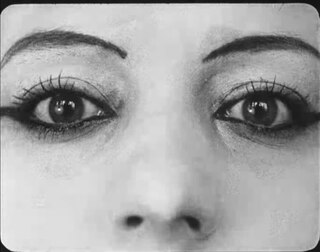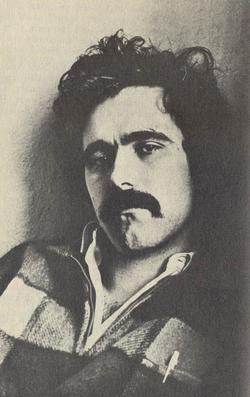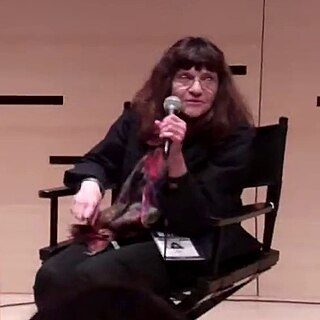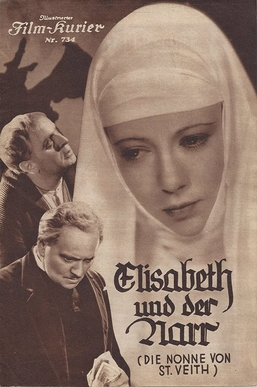| Serial Metaphysics | |
|---|---|
 A still from Wheeler Winston Dixon's film Serial Metaphysics | |
| Directed by | Wheeler Winston Dixon |
Release date |
|
| Language | English |
Serial Metaphysics is a 1972 collage film by experimental filmmaker Wheeler Winston Dixon. [1] [2]
| Serial Metaphysics | |
|---|---|
 A still from Wheeler Winston Dixon's film Serial Metaphysics | |
| Directed by | Wheeler Winston Dixon |
Release date |
|
| Language | English |
Serial Metaphysics is a 1972 collage film by experimental filmmaker Wheeler Winston Dixon. [1] [2]
An examination of the American lifestyle recut entirely from existing television commercials creating "a vision of the world as viewed through the eyes of the corporate sponsor with a target audience in mind". [3] [4] [5] [6]
Ed Halter from The Village Voice stated that Wheeler's "loopy Americana remix grooves to an increasingly trippy reverb." [7] [8]
The film was edited down all in one night on New Year's Eve from 72 hours of TV commercials. [3]
The Whitney Museum of American Art [9] showed the film (twice in 1973 and 1974) where then-curator Bruce Rubin commented that Wheeler "is a masterful film editor. His sensitivity to the movement within the frame and of the camera itself allows for fluidity in his editing that is exuberant and refreshing. It is as though his films tap into our collective unconscious by exploring the surface realities that permeate our lives."

Experimental film or avant-garde cinema is a mode of filmmaking that rigorously re-evaluates cinematic conventions and explores non-narrative forms or alternatives to traditional narratives or methods of working. Many experimental films, particularly early ones, relate to arts in other disciplines: painting, dance, literature and poetry, or arise from research and development of new technical resources.
Cinema Novo, "New Cinema" in English, is a genre and movement of film noted for its emphasis on social equality and intellectualism that rose to prominence in Brazil during the 1960s and 1970s. Cinema Novo formed in response to class and racial unrest both in Brazil and the United States. Influenced by Italian neorealism and French New Wave, films produced under the ideology of Cinema Novo opposed traditional Brazilian cinema, which consisted primarily of musicals, comedies and Hollywood-style epics. Glauber Rocha is widely regarded as Cinema Novo's most influential filmmaker. Today, the movement is often divided into three sequential phases that differ in tone, style and content.

Wheeler Winston Dixon is an American filmmaker and scholar. He is an expert on film history, theory and criticism. His scholarship has particular emphasis on François Truffaut, Jean-Luc Godard, American experimental cinema and horror films. He has written extensively on numerous aspects of film, including his books A Short History of Film and A History of Horror. From 1999 through the end of 2014, he was co-editor, along with Gwendolyn Audrey Foster, of the Quarterly Review of Film and Video. He is regarded as a top reviewer of films. In addition, he is notable as an experimental American filmmaker with films made over several decades, and the Museum of Modern Art exhibited his works in 2003. He taught at Rutgers University, The New School in New York, the University of Amsterdam in the Netherlands, and as of May 2020, is the James E. Ryan professor emeritus of film studies at the University of Nebraska in Lincoln.

Gwendolyn Audrey Foster is an experimental filmmaker, artist and author. She is Willa Cather Professor Emerita in Film Studies. Her work has focused on gender, race, ecofeminism, queer sexuality, eco-theory, and class studies. From 1999 through the end of 2014, she was co-editor along with Wheeler Winston Dixon of the Quarterly Review of Film and Video. In 2016, she was named Willa Cather Endowed Professor of English at the University of Nebraska at Lincoln and took early retirement in 2020.

The Quarterly Review of Film and Video is a peer-reviewed academic journal covering moving image studies, considered to be among the best-known journals in this field. It is published by Routledge. From 1999 to 2014, Wheeler Winston Dixon and Gwendolyn Audrey Foster were the editors-in-chief of the journal; on December 23, 2014 David Sterritt became the new editor of the journal.
A no-budget film is a film made with very little or no money. Actors and technicians are often employed in these films without remuneration. A no-budget film is typically made at the beginning of a filmmaker's career, with the intention of either exploring creative ideas, testing their filmmaking abilities, or for use as a professional "calling card" when seeking creative employment. No-budget films are commonly submitted to film festivals, the intention being to raise widespread interest in the film.

Ron Rice was an American experimental filmmaker, whose free-form style influenced experimental filmmakers in New York and California during the early 1960s.

Warren Sonbert was an American experimental filmmaker whose work of nearly three decades began in New York in the mid-1960s, and continued in San Francisco throughout the second half of his life. Known for the exuberant imagery of films such as Carriage Trade and especially for their intricate and innovative editing, he has been described as "the supreme Romantic diarist of the cinema" as well as "both a probing and playful artist and a keen intellect reveling in the interplay between all the creative arts."
El ojo de la cerradura is a 1964 Argentine film.

Amy Taubin is an American author and film critic. She is a contributing editor for two prominent film magazines, the British Sight & Sound and the American Film Comment. She has also written regularly for the SoHo Weekly News, The Village Voice, The Millennium Film Journal, and Artforum, and used to be curator of video and film at the non-profit experimental performance space The Kitchen.
Senses of Cinema is a quarterly online film magazine founded in 1999 by filmmaker Bill Mousoulis. Based in Melbourne, Australia, Senses of Cinema publishes work by film critics from all over the world, including critical essays, career overviews of the works of key directors, and coverage of many international festivals.

Storm de Hirsch (1912–2000) was an American poet and filmmaker. She was a key figure in the New York avant-garde film scene of the 1960s, and one of the founding members of the Film-Makers' Cooperative. Although often overlooked by historians, in recent years she has been recognized as a pioneer of underground cinema.

Tender Fictions is a 1996 autobiographical documentary film directed by American experimental filmmaker Barbara Hammer. It is the second of a trilogy of documentary films that includes Nitrate Kisses and History Lessons. Together, the three films are sometimes known as the "History trilogy". Tender Fictions details Hammer's life and her attempts to "construct" a self. The film was nominated for a prize at the 1996 Sundance Film Festival.
Fever is a 1981 Polish drama film directed by Agnieszka Holland. It is based on a story of writer Andrzej Strug. It was entered into the 31st Berlin International Film Festival where Barbara Grabowska won the Silver Bear for Best Actress.
Ngozi Onwurah is a British-Nigerian film director, producer, model, and lecturer. She is best known as a filmmaker for her autobiographical film The Body Beautiful (1991) and her first feature film, Welcome II the Terrordome (1994). Her work is reflective of the unfiltered experiences of Black Diaspora in which she was raised.

Goodbye in the Mirror is a 1964 black-and-white experimental film produced and directed by Storm de Hirsch.

Elisabeth and the Fool is a 1934 German drama film directed by Thea von Harbou and starring Hertha Thiele, Theodor Loos and Rudolf Klein-Rogge. The film was the directing debut of Harbou, who was known for her screenplays for directors such as Fritz Lang and F. W. Murnau. Filming began on 12 October 1933 in Meersburg and the Lake Constance area. The film's sets were designed by the art directors Kurt Dürnhöfer and Walter Reimann. The film premiered on 24 January 1934.
Paradise is a 1932 Italian comedy film directed by Guido Brignone and starring Nino Besozzi, Sandra Ravel and Lamberto Picasso. It was part of a group of "White Telephone" films made during the decade. It was produced by Cines, the largest Italian film studio at the time.
Apotheosis is a 1970 film directed by John Lennon and Yoko Ono.